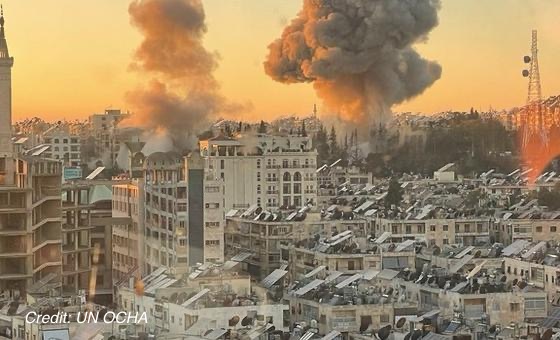Geneva/New York, December 9, 2024 – The collapse of the decades-old dictatorship under the Assad regime in Syria can restore peace and human rights to the country’s more than 24 million people, including 16 million who are in need of humanitarian aid, UN leaders said.
“After 14 years of brutal war and the fall of the dictatorial regime, today the people of Syria can seize an historic opportunity to build a stable and peaceful future,” UN Secretary-General António Guterres as Syrian rebels took over the capital Damascus. “Syrians now have an historic opportunity to build a stable and peaceful future but there is much work to be done to ensure an orderly transition.”
Guterres called for respect of the inviolability of diplomatic and consular premises and personnel in all cases in accordance with international law.
“We will need the support of the international community to ensure that any political transition is inclusive and comprehensive and that it meets the legitimate aspirations of the people of Syria, in all their diversity. Syria’s sovereignty, unity, independence and territorial integrity must be restored.
The UN will honor the memory of those who have borne the brunt of this conflict. We remain committed to helping Syrians build a country where reconciliation, justice, freedom, and prosperity are shared realities for all. This is the path to sustainable peace in Syria.”
In Geneva, UN News reported that Volker Türk, the High Commissioner for Human Rights, said in comments to journalists that the Syrian people, after “decades of brutal repression” by the Assad government, remain hopeful but anxious for the future and there is an opportunity now “to build a future grounded in human rights, freedom and justice”.
“The only way forward is a nationally owned political process that brings an end to the litany of suffering, fulfils the aspirations of all Syrians, and ensures truth, justice, reparation, healing and reconciliation,” he said.
The human rights chief called for justice for families of Syria’s missing persons, estimated at more than 130,000. The UN said the task of documenting Syria’s disappeared is carried out by three bodies at the UN:
The Independent Institution on Missing Persons in the Syrian Arab Republic – established by the UN General Assembly in June 2023; The International, Impartial and Independent Mechanism for Syria, which was established by the UN General Assembly in December 2016 and The Independent International Commission of Inquiry on the Syrian Arab Republic, which reports to the Human Rights Council in Geneva.
Highlights from the UN Spokesperson’s news briefing on Syria:
- Over 16 million people in Syria need humanitarian aid, with recent displacement of one million people, mostly women and children, from Aleppo, Hama, Homs and Idleb.
- Transportation disruptions and reports of looting of civilian properties and humanitarian supplies are hampering aid delivery.
- Health facilities are overwhelmed, with critical shortages of staff, medicine and supplies; health partners are deploying trauma care and mobile clinics.
- Despite challenges, UN agencies and humanitarian partners in northwest Syria have resumed operations, supported by cross-border deliveries from Türkiye.
- The $4 billion Humanitarian Response Plan is only 30 per cent funded, with growing needs as winter approaches. (UN News)
The Humanitarian Affairs and Emergency Relief Coordinator (OCHA) saidmore than 16 million people already required relief assistance before rebel forces Hayat Tahrir al-Sham (HTS) and others overthrew the Assad regime. OCHA said about one million people have up uprooted Aleppo, Hama, Homs, and Idlib governorates since November 28, the date the rebels launched their military operations. OCHA reported also that “significant and growing” returns to Syrian towns and cities, where reception centres are over crowded and resources are limited. “There is an urgent need for more shelter, food, non-food items, and sanitation facilities,” it said.
UN High Commissioner for Refugees Filippo Grandi said Syria is at a crossroads between peace and war, stability and lawlessness, reconstruction or further ruin.
“There is a remarkable opportunity for Syria to move toward peace and for its people to begin returning home,” he said. “But with the situation still uncertain, millions of refugees are carefully assessing how safe it is to do so. Some are eager, while others are hesitant.”
Grandi called for focusing on the issue of returns. “Whether the parties in Syria prioritize law and order will play a major factor in those decisions. A transition that respects the rights, lives, and aspirations of all Syrians – regardless of ethnicity, religion, or political beliefs – is crucial for people to feel safe. As the situation evolves, we will monitor developments, engage with refugee communities, and support States in any organized voluntary returns.
He said the needs within Syria remain immense. “With shattered infrastructure and over 90 per cent of the population relying on humanitarian aid, urgent assistance is required as winter approaches – including shelter, food, water, and warmth. UNHCR is committed to delivering this aid and calls on all parties to facilitate its delivery.” (By J. Tuyet Nguyen)
United Nations journalists – United Nations journalists – United Nations journalists
United Nations News – United Nations News – UN Correspondents Association – UNCA Awards

